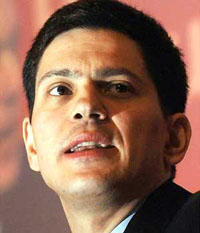Britain's foreign secretary warns Russia damaging its world standing

Russia and Britain continue accusing each other of different political and moral sins and show pretty good imagination.
After the debates about Andrey Lugovoi Russia has decided to close down branches of a British cultural organization and suspend participation in a key arms control treaty.
Britain’s foreign secretary said Thursday that the decision threatens to damage Moscow's global standing. He warned that the plans to force the closure of British Council offices in St. Petersburg and Yekaterinburg will erode already tense relations between London and the Kremlin, the AP reported.
David Miliband said that closing the offices would "constitute a serious attack against the legitimate cultural agent of the British government, would show a disregard for the rule of law and would only damage Russia 's reputation around the world."
And the British Council - a non-governmental organization that acts as the cultural department of the British Embassy - is accused by Russian officials of operating illegally in the two cities.
Recently, the Council organized a concert Moscow with British pop singer Lily Allen and an exchange program for amateur soccer players. Iran and Myanmar (or Burma ) are the only states where the organization is not allowed to operate.
"Russia's threats set back bilateral and multilateral efforts to improve cultural links," Miliband said.
He also criticized Moscow's decision to suspend participation in the Conventional Forces in Europe treaty, which limits the number of conventional weapons deployed west of the Ural Mountains - the edge of European Russia.
It also compels members to exchange information on the whereabouts of their forces.
"This Russian decision is unjustified," Miliband said. "If Russia were to persist in this course of action, in the longer-term that would erode the transparency and predictability which ... contributes to overall stability in Europe."
Relations between Britain and Russia have soured badly during the last year, chiefly over the slaying in London of Russian dissident and ex-security agent Alexander Litvinenko.
Britain was disappointed with Russia ’s refusal to extradite Andrey Lugovoi, the key suspect in the 2006 killing. But Russia says its constitution prohibits it from doing so.
Moscow is equally angered that British courts have turned down extradition requests, particularly for Kremlin critic Boris Berezovsky and Chechen separatist envoy Akhmed Zakayev. Both men have been granted political asylum in Britain.
Four Russian diplomats were expelled from Britain in protest at the refusal to extradite Lugovoi in July. In response, Russia ordered four British diplomats to leave.
Subscribe to Pravda.Ru Telegram channel, Facebook, RSS!


